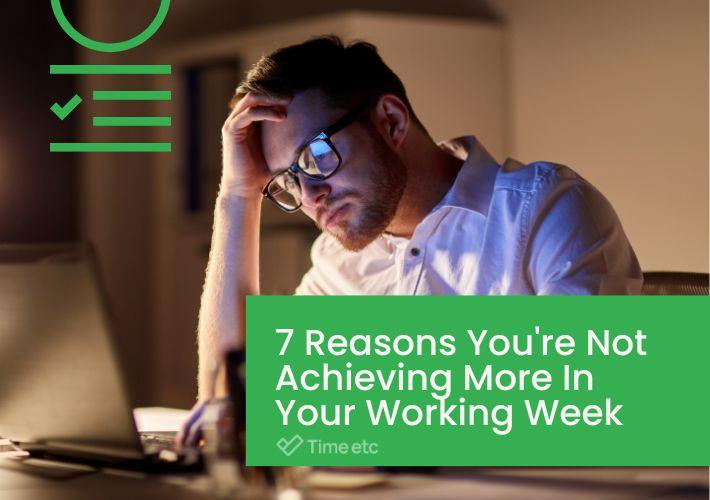As business owners, many of us face the same problem.
We start the week with the best of intentions, then before we know it, the days have flown by. Despite our best efforts, we can't help but wonder what it is we've actually achieved.
It's not that we're not relentlessly busy, and it's not that we're not putting in the hours. Quite the opposite in fact, we tend to clock up around 47% longer work weeks than the national average.
So, what are the real reasons why our hard work doesn't seem to be paying off?
And more importantly, how can we overcome them?
1. You've set unrealistic goals
"Our goals can only be reached through a vehicle of a plan, in which we must fervently believe, and upon which we must vigorously act. There is no other route to success." - Pablo Picasso
Goals are fascinatingly powerful things. Goal-setting is not merely an exercise in wishful thinking, it's one of the most effective methods that can propel you toward success. Because without a goal, it's difficult to know what you're working towards or how to get there.
So why do only around 8% of people achieve the goals they set?
You may have heard the phrase "shoot for the stars," but in fact, this may not be the best approach to get results.
Setting goals that are too lofty and ambitious can be counter-productive for a number of reasons. For starters, it can be disheartening and discouraging when your goal is always just beyond your reach, no matter how hard you try. Plus, the delayed gratification of achieving something in months or years to come may not be enough to keep you motivated in the present.
Write down two goals: a big goal and a now goal.
The first is your long-term goal, your vision for your business. It must be specific, like growing to $1M annual revenue or winning 5,000 customers.
According to the results of an often-cited study by psychology professor Dr. Gail Matthews at Dominican University of California, people who write down their goals are a whopping 42% more likely to achieve them than those who don’t.
Why is this?
First of all, our brains tend to be significantly better at remembering things we’ve written down ourselves. Neuropsychologists call this 'the generation effect'.
Secondly, the process of writing your goals out in black and white gives you a clear understanding of what you’re actually trying to achieve. Like planning a vacation, you start by choosing your destination first. If you didn’t know where you were going, how would you know if you’d arrived?
Once you know your destination, you’ll have a much better idea of the steps you’ll need to take to make it happen. This is where your now goal comes in.
This should be something that's attainable within the next few months, launching an ambitious new marketing strategy, doubling your sales team, or securing ten new clients, for example. And if you hadn't already guessed, this now goal must directly contribute to you achieving your big goal.
It may not work, and that's perfectly fine. It may be that you need to test one now goal, and then another, and another. But with each attempt, you’re eliminating the options and getting closer to achieving your big goal.
And as the saying goes, “Out of sight, out of mind.” Another benefit of writing your goals down is that you have a constant physical reminder of what you want to accomplish. Always keep them close at hand, and clearly visible. This will help you be more intentional about how you spend your time each week, and stay focused and driven.
See: Why Motivation Matters: The Key To Success For Entrepreneurs
2. You're not taking breaks
"Each person deserves a day away in which no problems are confronted, no solutions searched for." - Maya Angelou
As the leader and driving force behind your venture, your well-being directly impacts the health of your business.
When you continuously push yourself without taking enough time for rest and recovery, your productivity levels can drop off a cliff. If you're exhausted and overwhelmed, it's increasingly difficult to make sound decisions, provide quality leadership, and keep up the motivation needed to drive your business forward.
Try using a scheduling or calendar app instead of a to-do list
We're far less likely to make time for a break when we're under pressure, but this is exactly when we need it the most.
Instead of working through tasks in a to-do list and telling yourself you'll take a break "if you get time", create time-blocks in your calendar to dedicate to each task. Schedule your breaks just like you would any important appointment, and honor them accordingly.
Even when there are still tasks that need to get done, don't give in to the urge to keep working through your scheduled break. Your body, mind, and business will thank you.
See: 3 Ways Your Calendar App Can Make You More Productive Every Day
3. You're getting derailed by digital distractions
"If we let ourselves, we shall always be waiting for some distraction or other to end before we can really get down to our work." - C. S. Lewis
There's no denying that computers and smartphones have transformed the way we live and work, but it's come at a cost. Over the years, billions of dollars have been invested in making sure they are the perfect distraction devices.
Most of the apps and websites we visit have been designed to be as user-friendly—and addictive—as possible. Facebook, for example, was built to exploit "a vulnerability in human psychology" using a “social-validation feedback loop”, according to ex-president Sean Parker. He admitted that this "probably interferes with your productivity in weird ways," as the team who launched the platform was trying to figure out from the start how to “consume as much of your time and conscious attention as possible".
Not only that, we might not even have to be using our phones for them to affect our ability to focus and be productive. Simply hearing your phone buzz is enough to distract you and impede your performance.
And it doesn't stop there, many of us are prone to experiencing the mental phenomenon known as "phantom vibration syndrome", where your brain is tricked into thinking you felt your phone vibrate when it’s in your pocket. You check your phone and find zero new notifications, meaning you've broken your concentration from the task at hand for nothing!
Research suggests that it can take around 23 minutes to get back on track mentally after each distraction, so even a few instances could cost you over an hour of productive work each day. But what happens when the average person checks their phone every 12 minutes? I'll let you do the math on that one!
Be aware
While the most obvious solution may be to put your phone away completely during the day, chances are this is much easier said than done for most business owners. If we can't eliminate distractions completely, we must try and reduce their impact.
The simplest way to do this is to try and become more aware of distractions when they occur.
Because in most cases, digital procrastination is an automatic response. Very few of us deliberately make a conscious choice to not do our work. When you touch something hot, you don’t have to think about moving your hand away. In the same way, sometimes we don’t even realize we’ve gone down a YouTube rabbit-hole until half an hour later. But distraction didn’t occur slowly over those 30 minutes, it took a split second to pick up your phone or open that new tab.
As soon as you catch yourself reaching for your phone, or find your thumb hovering over a certain app, ask yourself: "How will this help me reach my goals?" If you can't answer that question satisfyingly, immediately return to whatever you're working on. It's easy to tell ourselves that checking the news or scrolling through your inbox is useful for work, but let's be honest, neither are likely to be the most urgent or important use of your time in the moment.
4. You're struggling with self-doubt
"Just believe in yourself. Even if you don’t, pretend that you do and, at some point, you will." - Venus Williams
While our intuition is usually a good guide, it can sometimes lead us astray. If you've ever found yourself questioning whether or not you're doing enough to be successful, you're certainly not alone.
84% of entrepreneurs and small business owners have reported experiencing 'imposter syndrome', with over 20% feeling like their success is purely down to luck.
There’s nothing more paralyzing for a business owner than the doubt that lives in their head. What happens when you're always second-guessing yourself, overthinking your decisions, or slowing down when you should be speeding up?
That’s right. You stop moving forward.
Remember your strengths and skills
As business owners, these negative inner voices are among the worst enemies we encounter on our journeys toward success. Self-doubt and negative thinking are like the schoolyard bullies. They kill your confidence and hold you back from doing the things you know you should. That's why it’s so important to do what we can to drown their voices out.
When that dreaded voice of doubt begins to emerge, don't let it be a one-sided conversation. Start speaking back to it. Remind yourself that you have a solid set of skills and abilities that have got you to where you are today, and will take you through whatever your journey brings.
Make a list of your accomplishments and successes, look back through past emails from clients or colleagues praising your work, read through positive customer reviews for your business—anything that will help restore your self-belief.
5. You're bogged down with menial, repetitive tasks
"The most dangerous kind of waste is the waste we do not recognize." - Shigeo Shingo
When you’re first starting out as a business owner, you probably accept that wearing many different hats is part of the job description. But as your business grows, so too does the work needed to keep the wheels turning.
There's no denying that all those regular, day-to-day tasks, such as scheduling meetings in your calendar, posting on social media, invoicing, and updating your website, do need to be done to keep things running smoothly.
But think about it. If most of your time is spent crossing off the same tasks from your list, only for you to have to do them all again the next day, week, or month, when will you have the chance to focus on the high-impact projects that'll help you reach your big goal?
Take email, for example. The average full-time employee spends 28% of their work day reading and replying to emails, yet it's estimated that only 38% of emails in the average inbox are important or relevant. That’s roughly 2 hours and 14 minutes per day, 11 hours and 10 minutes per week, or five full working days per month lost to one low-value task alone.
Start automating, delegating, or eliminating
Yes, these tasks need to be done, but do they need to be done by you?
Make a list of all the different tasks and projects you're currently responsible for. For each one, ask yourself "Can this task only be completed by me? Could someone else do it if I showed them how?" If it doesn’t require your specific knowledge or expertise, and it would be possible for someone else to do it with the right instructions, then you should consider taking it off your hands.
Alternatively, our free to-do list optimizer can do this for you. Simply enter your list of tasks and the optimizer tool will tell you which tasks should stay in your remit and which can be offloaded.
"What happens to those tasks now?" I hear you ask.
If you have strong systems in place that will work consistently without your involvement, consider if any of these tasks could be automated.
It's unlikely that you'll be able to automate everything, however, as some tasks will require a more human touch. Delegating those tasks to a capable team member or skilled professional will make sure they receive a more personalized level of attention that technology might lack.
And if there's anything on your list that creates little to no value at all, it may be much more beneficial in the long run to eliminate it completely and reallocate your resources to get a greater return on investment.
6. You're constantly being pulled in different directions
"Family, religion, friendship. These are the three demons you must slay if you wish to succeed in business." - Mr Burns, The Simpsons
According to recent statistics, 29% of the working day is spent communicating with others. I'm willing to bet this number is much higher for business owners.
In your professional life, you're the leader, the source of all knowledge, the ultimate authority. As such, people are bound to come to you for answers to questions, solutions to problems, opinions, approvals, and sign-offs. In your personal life, you may be a partner, a parent, a child, or a sibling. Each role brings a whole new set of responsibilities to the table, depending on your situation.
While there's little we can do about that, there are a few things we can do to restore some balance.
Set boundaries to manage expectations
Setting healthy boundaries around your time and professional capacity is what makes it possible to do your best work and achieve your goals without neglecting anyone.
Schedule an 'open door' hour each day, during which your team members can walk into your office or arrange a call to speak with you. The rest of the time you’ll be free to focus on your core tasks and, without constant interruptions, it'll be much easier.
You might also find it useful to add an email signature or an auto-response to let people know that you're not reachable outside of work hours, so you can be fully present at home and enjoy your free time with your loved ones.
Setting boundaries often means saying "no" more than you're used to, which can be a tough habit to break. But it's important to remember that in this instance, "no" is really a "yes" to more meaningful work and more time to focus on what matters most.
7. Worrying about the future
"Life can only be understood backwards; but it must be lived forwards." - Søren Kierkegaard
It's an unfortunate reality that being your own boss can bring tremendous pressure, and the feeling that whether your venture succeeds—or fails—rests solely on your shoulders. So sadly, it comes as little surprise that 75% of small business owners are concerned about their mental health, while a staggering 56% have actually been diagnosed with anxiety or stress-related problems by a professional.
Not merely a highly unpleasant feeling, stress can cause a wide range of physical health issues—from a weakened immune system to migraines, and even heart attacks and strokes.
Running a business can be challenging enough when you’re in full health—let alone if you’re sick—so it's crucial to not let this stress and anxiety take over.
Challenge your thinking
It can be tough not to ruminate over worst-case scenarios, but a key first step to stop those niggling anxious thoughts from spiraling is to take a critical perspective. Challenge your thinking by asking yourself objectively, "Is this true?"
Perform a risk assessment to determine how likely your worry is to transpire. In most cases, you'll be relieved to find that the probability is slim to none. Alternatively, it gives you an opportunity to be proactive and take preventative action, which can help you feel more in control and confident in your ability to weather the storm.
See: 6 Stress Management Techniques From The World’s Most Successful Business Leaders
What's the bottom line?
From unrealistic expectations to daily distractions, there are many culprits that can cause a productivity drought and stall progress toward your goals.
The good news is, however, there are plenty of solutions that can make a big difference. With some simple adjustments and a fresh mindset, you can break the cycle, restore balance to your work days, reclaim valuable time for what matters most, and achieve more.







